Oral History no. 6
"Shells, Songs, and Summer Afternoons: Marilyn Shotwell’s Life in Ocean Grove"
Listen to her story.
Marilyn Shotwell reflects on her lifelong connection to Ocean Grove, New Jersey, where her family bought a home in the mid-1940s following a hurricane. Her childhood was deeply rooted in the town’s church-centered community, including fond memories of Thornley Chapel, walking everywhere due to the Sunday car ban, and early entrepreneurial efforts like making jewelry and selling hymn books. She describes a vibrant upbringing with friends, school, and work at local businesses like The Shell Shop and Cozy Cottage. Marilyn met her future husband, David, through local church activities, and they married in 1958. She’s lived in her current home since 1962, raising a family and engaging in the town’s musical and artistic life. Marilyn expresses concern about recent changes to Ocean Grove's character but remains devoted to its traditions, especially the auditorium and its programs. A talented painter and woodcarver, she continues to create art inspired by her travels and family life.


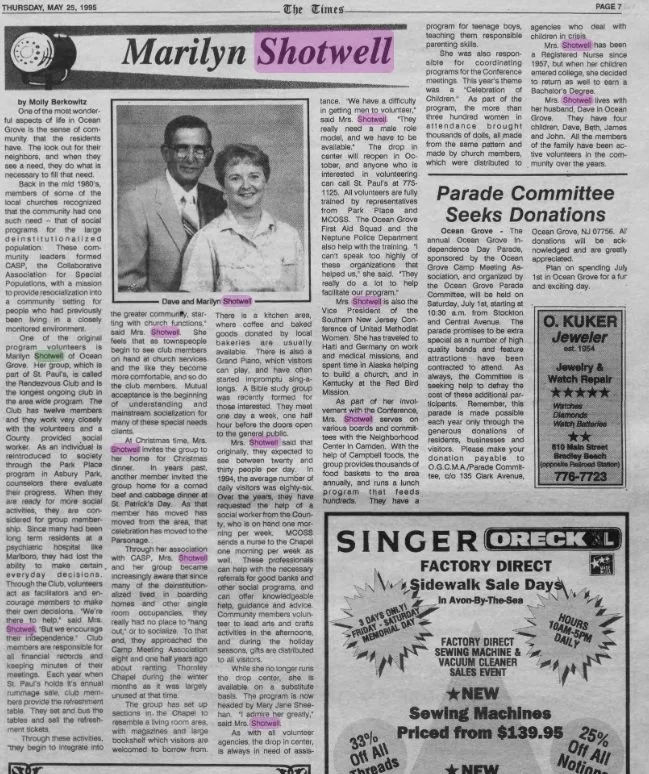
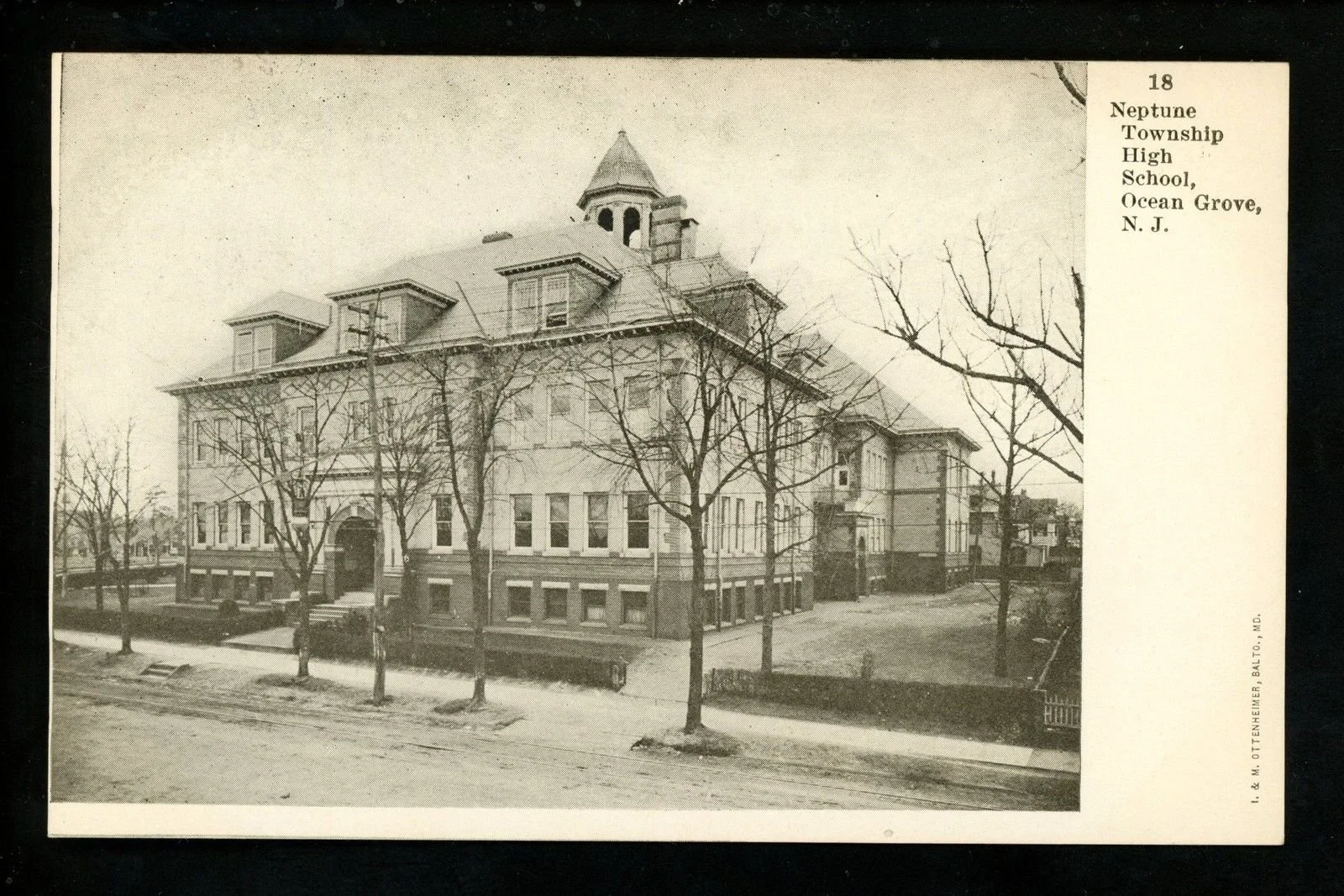
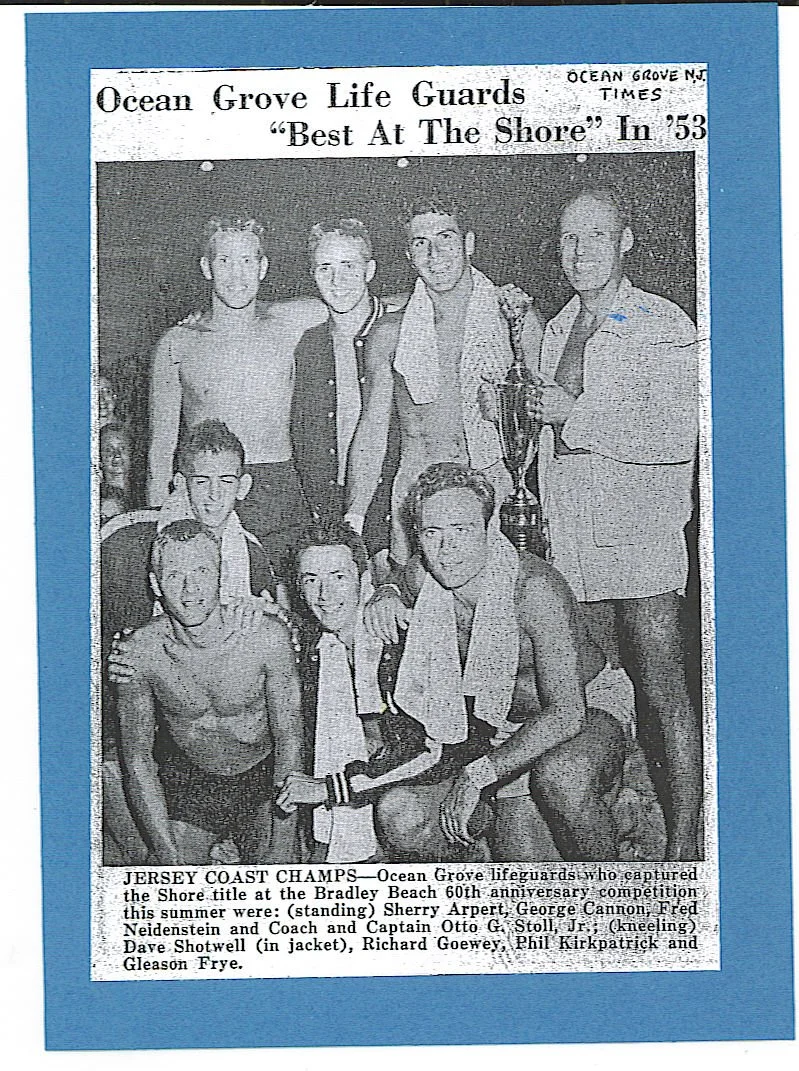



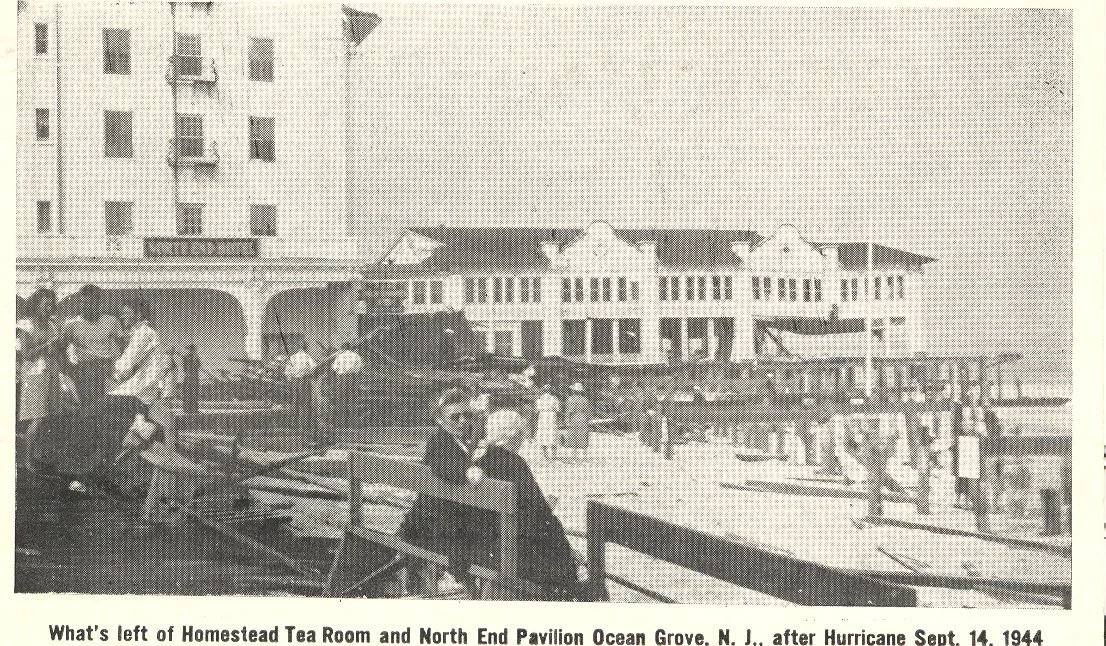


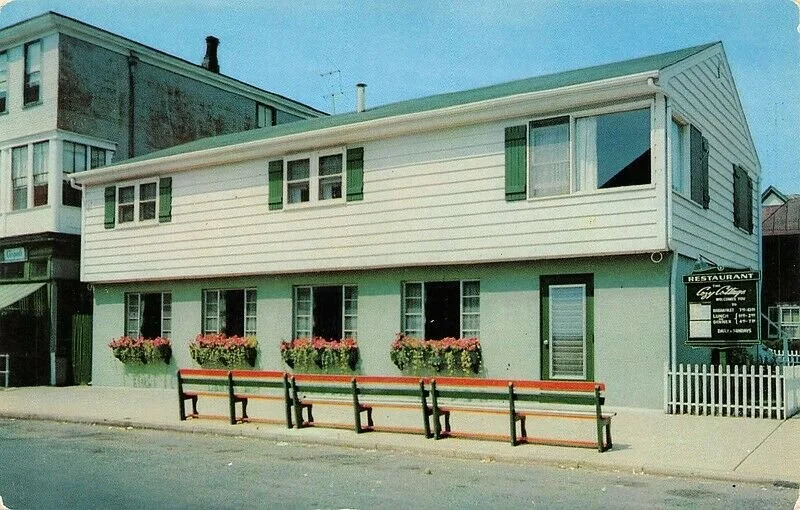


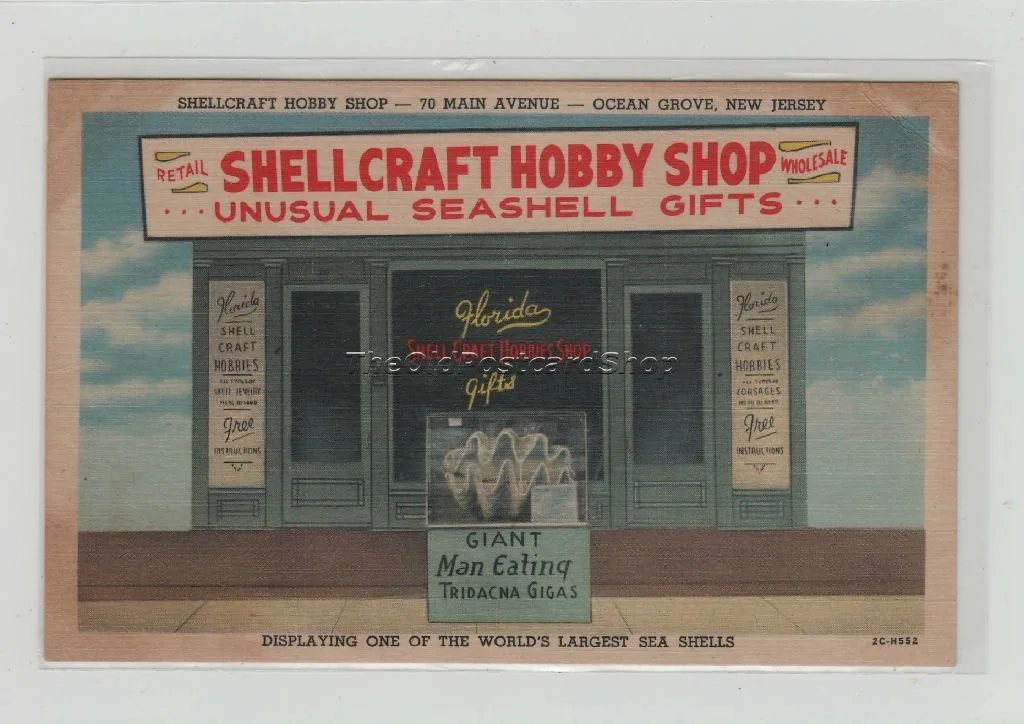
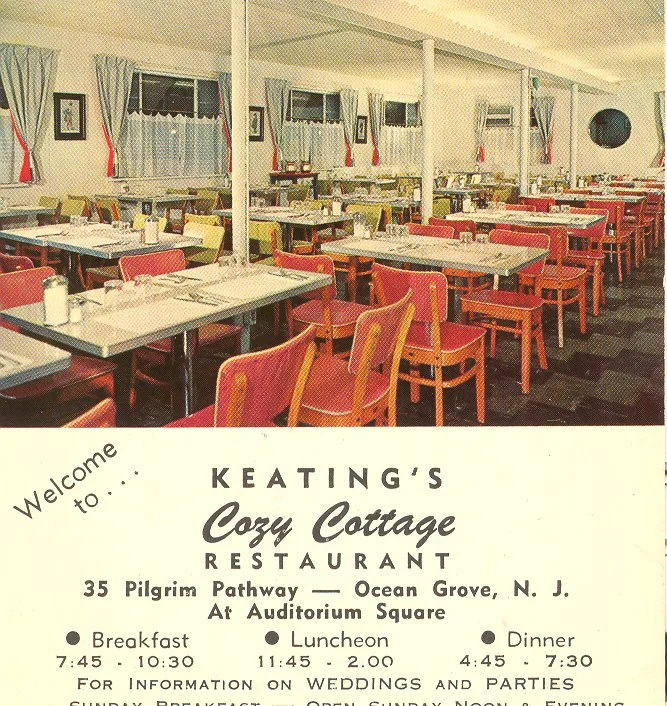
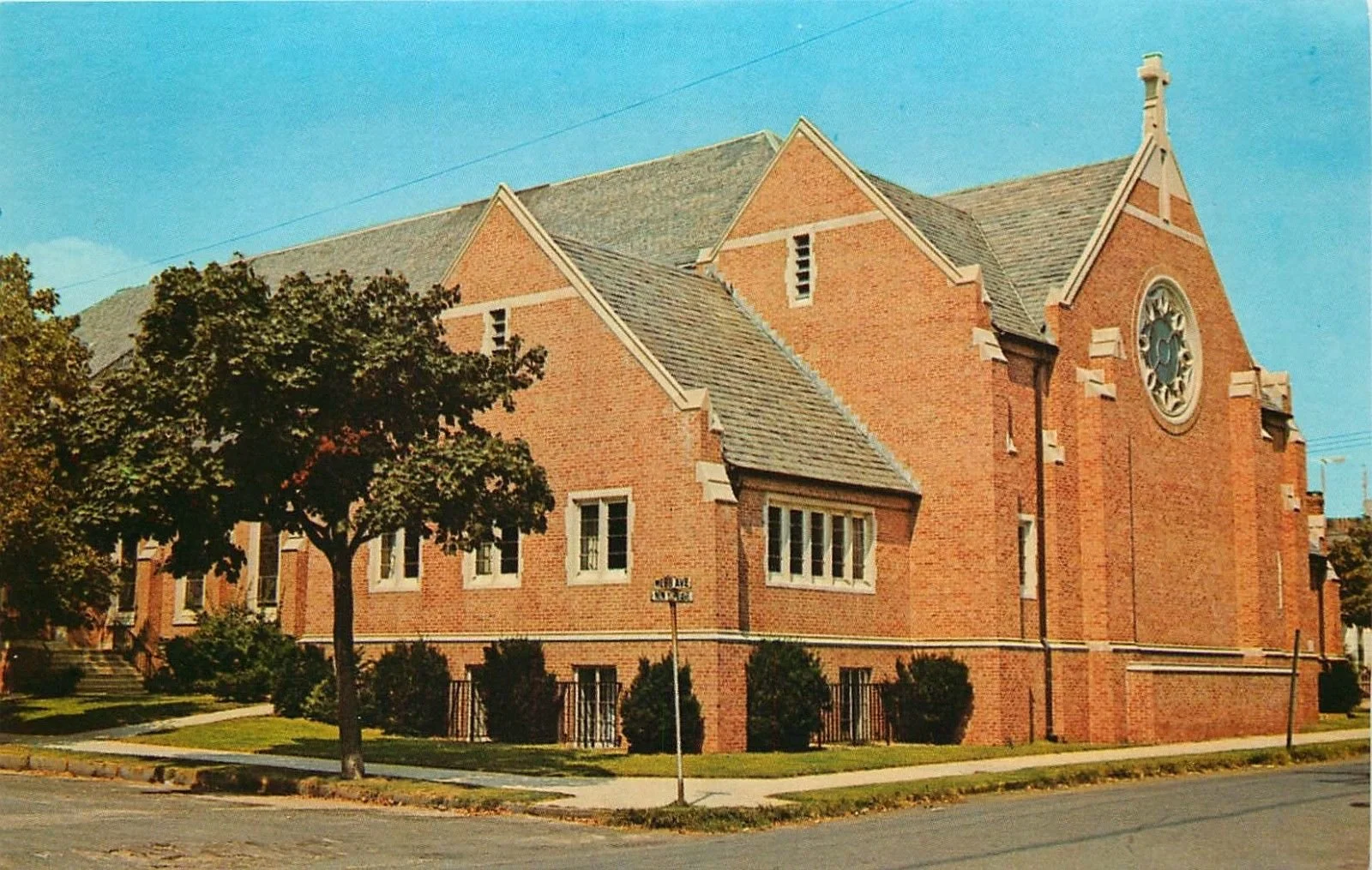
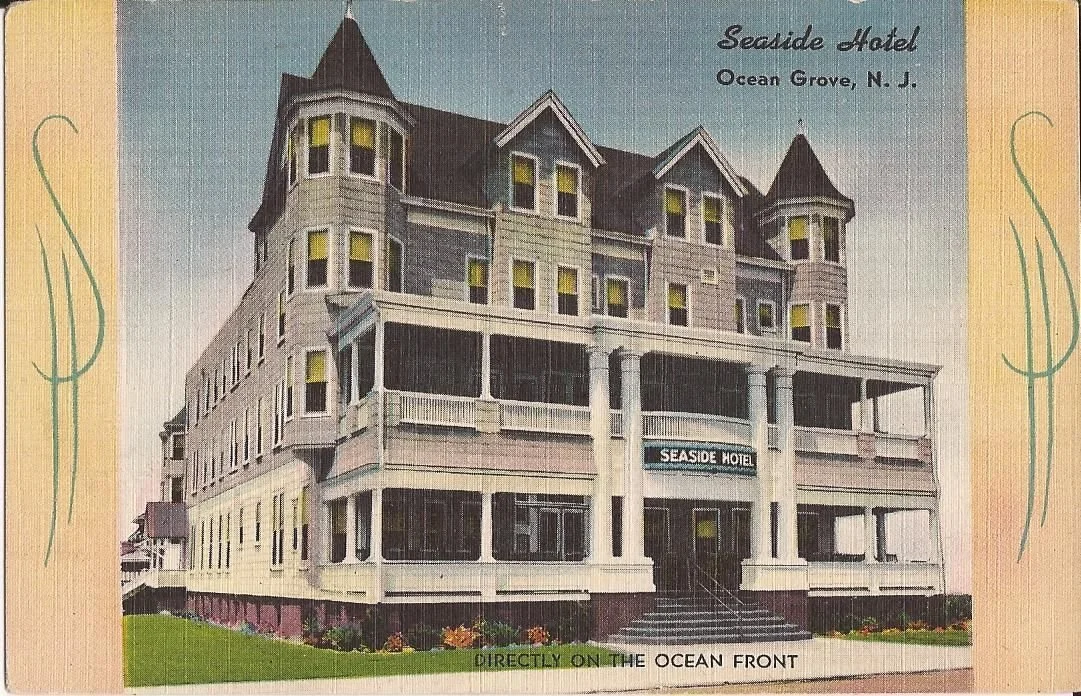
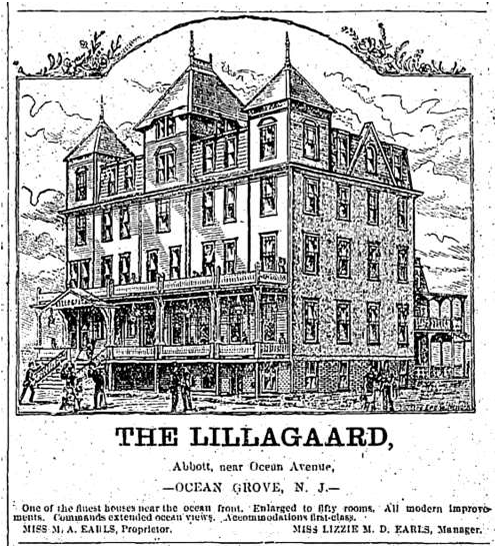
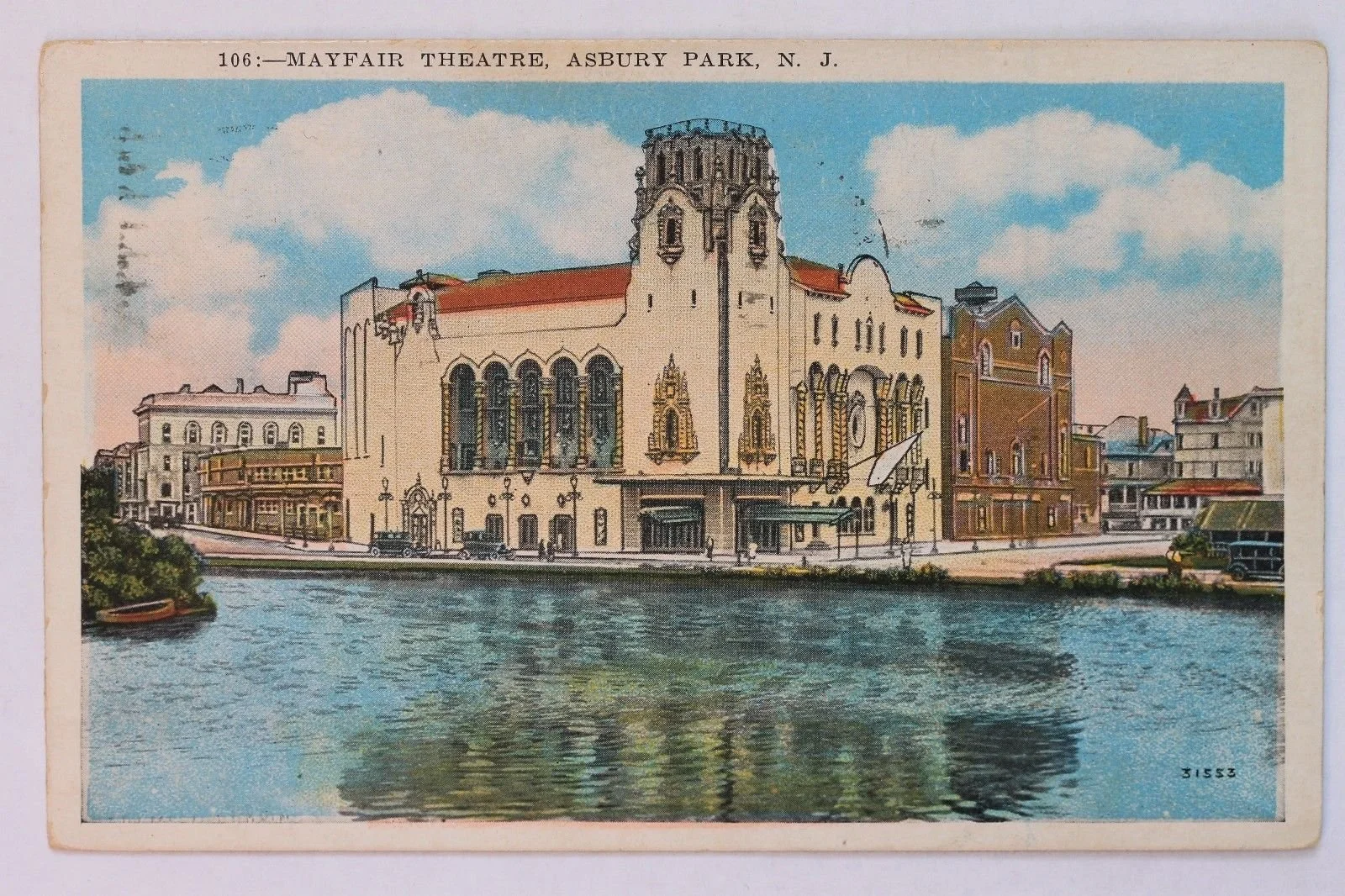




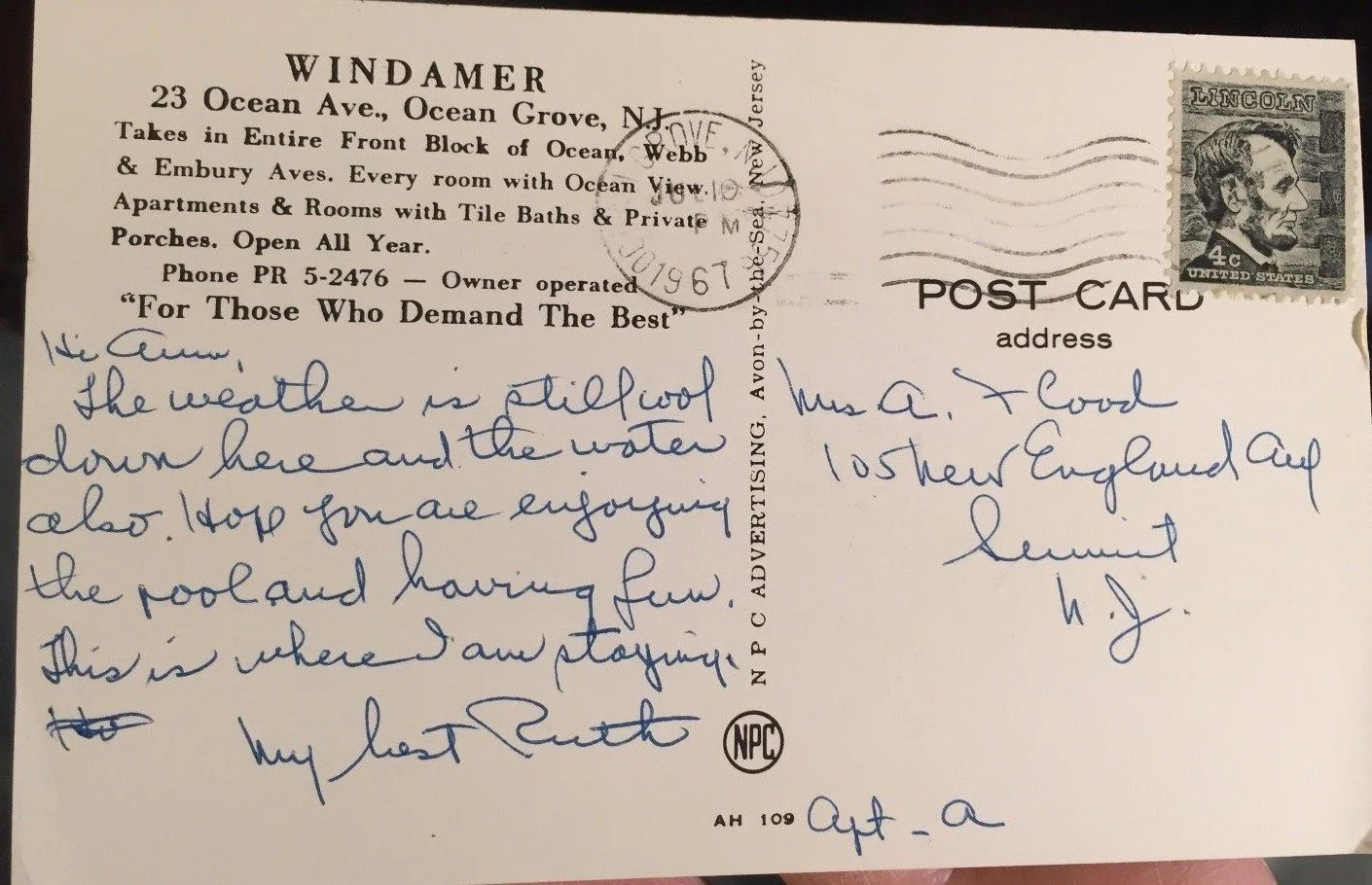
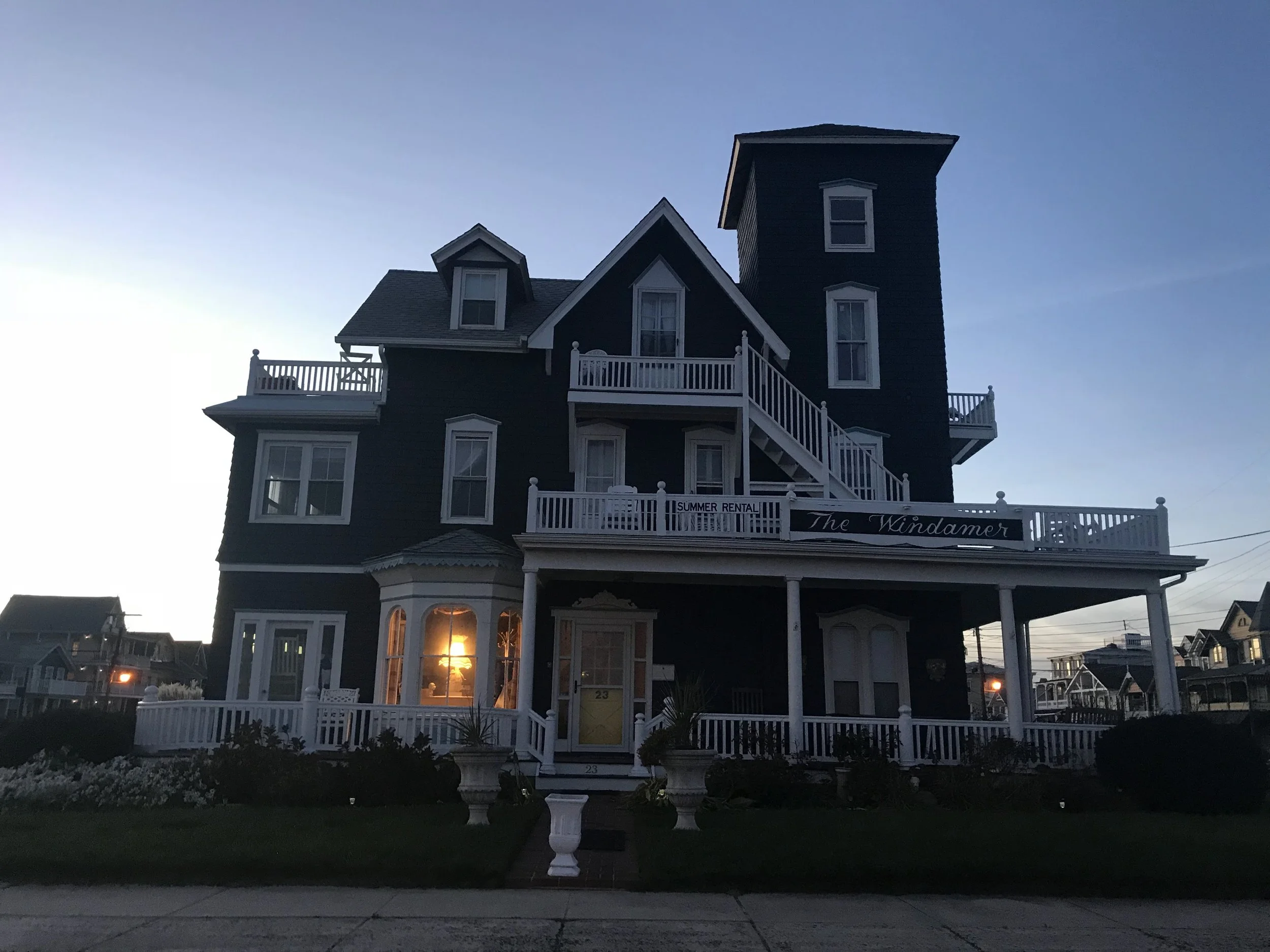
Melinda: Today is April 19th, 2024. I am Melinda Alan Grote, and I am in the home of Marilyn Shotwell in Ocean Grove, New Jersey. And we're recording her memories of being in Ocean Grove for the Historical Society of Ocean Grove's Oral History Project. So thank you so much for meeting this afternoon. And tell me a little bit about your earliest memories of being in Ocean Grove and what year that was?
Marilyn: Okay. My parents bought the house at 23 Ocean Avenue right after the hurricane that I think was in 1944 or '45. And so the lawn was covered with sand. And my father took out all the hedges that were around the house and swept off all the sand and had it removed. And then he turned over the whole lawn, and crickets came out by the thousands, I think. And my mother was very upset because they came in the house and they ate the wool rugs. They ate holes. So that was one of the first things I remember about it. But the other thing was that I got to go to Thornley Chapel. And I just love Thornley Chapel because I love to sing, and we sang all kinds of little hymns and choruses, and I learned a lot of them by heart. And I can still sing them today. And so that was the one thing I always wanted to come back. We had a house up in Preakness, New Jersey, and we went back there for the winter, I think for two years, maybe. I was in school down here for a month or two, and then we would be back up north, and then we'd come down in early spring, and I would be back in school down here, and that was very difficult to keep making those changes. But then we came down here to stay when and my parents split. Mom decided she needed to live in this house or she might lose it.
Melinda: What brought your parents to Ocean Grove to begin with?
Marilyn: Well, they wanted to have a house at the shore, and my mother had come to Ocean Grove as a young girl, and she used to stay at The Lilligaard for a week or so. And she always liked the town, and would go to The Auditorium things, and she just thought it was a good place to be. She liked the ambiance of the town, and but they looked at everything from Atlantic City on up the Seaboard, and she didn't like anything that she saw. And so they finally settled on Ocean Grove. And without going into a lot of family history, they separated. And so my mother got the house here. And of course, all the kids lived with mom, and but my brother and my older sister were quite a bit older. My brother was 10 years older than I. I guess I was eight the first year we came here, and and after that, when they split, I was 10. And we were here after that the whole time.
Melinda: Do you have any idea what they paid for the house in 1944?
Marilyn: The Windermer? No, I don't.
Melinda:
Okay. It'll just be fascinating to know.
Marilyn: It runs in my mind, it was something like $18,000.
Melinda: Okay.
Marilyn: But I couldn't swear to that. That's okay. So what was it like- At 10 years old, you don't even think about stuff like that.
Melinda: So that house is the house that you grew up in?
Marilyn: Yes.
Melinda:
Tell me about the house.
Marilyn: Well, my father had been a builder, and so he had torn it apart and made apartments out of it. Instead of the shed on the back that was a kitchen, he built it. So it was two stories tall and put in kitchens on the second floor as well as the first floor and bathrooms as well. So the rooms on the top floor, the third floor, had to come down to the second floor bathroom, and in the hallway. But other than that, they all had their own bathrooms. So they were two-room apartments with a bath and a kitchenette, and they all had their own porches, which was nice.
Melinda: And you lived on the first floor? The family lived on the first floor?
Marilyn: Yes and no. If we had rented the first floor apartment, then we went to the basement. Okay. And we had a little kitchen in the basement, and we had a larger room that had beds in it that we could sleep for the summer. We were hardly there. We were on the beach or working or whatever. And there was a shower down there, and so we made out fine. Little kitchenette.
Melinda: So you were growing up in the late '40s and '50s here in Ocean Grove?
Marilyn: Yes.
Melinda: So what was it like back then?
Marilyn: Well, of course, there were no cars on Sunday, so you could walk every place. And so we walked all the time to church on Sundays, and that was our life. It was all centered around church. And we walked, of course, to The Auditorium. And in the summer, of course, we were either Thornley Chapel or the Young People's Temple, and they had things going on for us, too. And then, of course, we lived on the beach until I was old enough to work. And my first job was The Shell Shop. I learned how to make jewelry from The Shell Shop, and then I sold it to the guests in my mother's house, because when they saw what I was doing, they would say, 'Oh, will you make me earrings in such and such a color?' And I I would go get the shells that I needed, and then I would put them together. So I had a little business going, and then The Shell Shop found out I was selling what I was making, and they said, Well, why don't you just work for us and we'll pay you?
Melinda: Where was The Shell Shop?
Marilyn: Where the real estate office is now, next to the dentist. Okay. Okay. It was in the green building.
Melinda: Okay, so you were making jewelry at the shell shop as a teenager?
Marilyn: I was about 14, maybe 13. Oh, and before that, I sold him hymn in the programs during the day, like a young people's temple. I had a pile of books in my arm, and I'd walk up and down the aisles, and if somebody wanted a book, they'd signal me, and then they'd buy a book for 40 cents, and I made a nickel.
Melinda: That was a good deal.
Marilyn: It was. So I had a little spending money And so that was fine. And when I got to be 16, then I started waitressing.
Melinda: Where?
Marilyn: Well, it was Cozy Cottage. It's law offices now, right across from the Chapel.
Melinda: Okay.
Marilyn: Yeah. And I worked for them for three summers, and then I went to the Seaside Hotel. And I made more Cozy Cottage than I did at the Seaside Hotel.
Melinda: Where was the Seaside Hotel?
Marilyn: Well, the Seaside condominiums are still there up on the oceanfront. They had a huge dining room, and of course, they rented rooms, and people would come the week and buy the meals, too. It was, I guess, what you'd call a package deal to have the meals as well as... And so they'd have a five o'clock sitting, and then they'd have a later sitting, and we would rush around with trays and... [M: And serve the meals]. They got what was cooked that day.
Melinda: So there wasn't a menu?
Marilyn: No. They would have maybe three entrees, and you could choose between them. It wasn't much of a menu.
Melinda: I'm sure it was fine. What was it like during the winters?
Marilyn: Well, there were fewer people in town, and in some ways, that was nice. But there were plenty of things to do. Like I said, we went to Saint Paul's, and there were church activities there. And of course, we were in school, and there were school activities. And so we really didn't lack for much. It was quiet her on the oceanfront because there were not many cars up there. But my family didn't have a car. My mother didn't drive.
Melinda: Okay.
Marilyn: And so we walked everywhere. And often on a Friday night, she would take us to the movies.
Melinda: And where was the movies?
Marilyn: Well, in Asbury Park, just across the bridge. There was the Mayfair Theater and the St. James Theater, and the Lyric Theater. They were all there, right close. And so we had a great choice of theaters then, and the Mayfair was beautiful. I was so sorry they tore that down. That was a magnificent building.
Melinda: So did you grow up with other kids? Were there other families around?
Marilyn: Oh, yeah. I had a lot of playmates.
Melinda: Okay.
Marilyn: Yes. Well, there was an Ocean Grove School right down the street.
Melinda: Where the old high school was? Yeah. Right. So that was an elementary school also?
Marilyn: Yes. And so we walked from the oceanfront to school every day, home for lunch, and back to school for the afternoon.
Melinda: The days when we went home for lunch.
Marilyn: We got our exercise. And by the time we walked home all the way to the beachfront for lunch, we didn't have much time to eat. But then the store on this corner, which is now an antique shop. He used to have a grocery, and there was Penny Candy. And so we could go in there, and we'd take so long picking out our candy. It was ridiculous. And I'm sure he could have shot us, but they were patient with us while we got our little Mary Janes pieces and spent another penny on something else. So that was nice.
Melinda: Lots of fond memories.
Marilyn: Well, yeah. Yeah.
Melinda: Anything that stands out in particular? A little tidbit, a little nugget about Ocean Grove back in the '50s... '40s? '50s?
Marilyn: Well, by the time I got to high school, of course, we were having boyfriends. And in the summer, the merry-around was down at the North End. And I had a girlfriend, Ethel Sterling. The Sterlings were a big name in town because her grandfather was on the board, I guess, for the Ocean Grove camp meeting. And he was a very strict Methodist. And his wife had been an opera singer, but she had this big trunk full of costumes, anything you could imagine. So for Halloween, we would go to her house, and we would say, I want to be a whatever. And she would say, Well, let's see what we have. And so she'd go digging around in her big trunk, and she would come up with pieces of this or that or the other thing, and we could make a costume out of And so that's one thing. And then as the years went by, Ethel wanted, 'Oh, come with me down to the merry-go-round'. I don't want to go alone. So if we're, I guess it was only a nickel, you could ride the merry-go-round. And catch rings. If you got the gold ring, you could get a free ride. So, okay, I go with her. And she was really crazy about this boy at the merry-go-round who collected the tickets. And so he'd walk around while the merry-go-round was running and collect your ticket from you. And I could not see what she saw in him. He was tall and skinny and had pimples. I just could not see it. And later on, he became a lifeguard. I married the lifeguard.
Melinda: The tall, skinny, pimply guy. So was he from Ocean Grove, too?
Marilyn: Well, yes. His grandfather had a tent, and eventually, they bought a house, and his mother's family also had a house, and they were nearby July. And Katherine and Ed married, and they had a house at 122 Pilgrim Pathway, which is on the corner of Stockton. And that's where he grew up, summers. And then in the winter, they were in Maplewood.
Melinda: Okay.
Marilyn: So he was here every summer. And he and Bill, his younger brother, would come into the Young People's Temple while I was in high school, I guess. And sometimes before that. And Mr. Eddowes, who was the choir director and everything, he would say to them, Okay, sit down. There were two grand pianos there, and Josephine would be on one, and the other one, one of those boys would sit down and play. They were both excellent pianists. Mr. Eddowes called my husband 'Spider'. Because he was tall and gangly. So he'd say, 'Spider, play whatever'. And of course, David could play by ear as well as playing the music. And so he would just play it, whatever it was. And whatever Josephine was playing, he'd play the countermelodies. So it was somebody I knew from being in town. And then his father taught my Sunday school class when I was working at the Seaside.
Melinda: Okay.
Marilyn: And then he knew that I was going to go to school Orange Memorial Hospital for Nursing. And that's close to Maplewood. So they had me in for dinner. And the boys were there. And there was nothing going on, but we had a good time. And when I finished nurses training, David was out of college, and he was teaching down in Ocean Township, but living in the summer house. Here in Ocean...for the winter. So we were both singing in the choir in St. Paul's. So I said to my mother, they were very nice to me when I was in college up at Nurses Training. And so I said, we should at least have them for dinner once. And suddenly that became a regular thing. How lovely.
Melinda: How lovely.
Marilyn: And a year later, we were married.
Melinda: So what year was that?
Marilyn: We got married in 1958. Okay.
Melinda: And how old were you then?
Marilyn: Oh, I was old. I was 22. But all my friends were already married. It was such a different thing then.
Melinda: Yeah. And where did you live?
Marilyn: When we got married, we lived in their summer home. Okay. And when they were family was down in the summer, we lived there. And then we rented the house at 123 Central a couple of years, but we had to get out in the summer because that family wanted it. That was the Jenkins's then. And so we lived with Dave's parents in the summer for a couple of years, and then we were in here.
Melinda: And tell me again when you bought this?
Marilyn: 1962. Okay.
Melinda: What was Ocean Grove like in 1962?
Marilyn: Well, there still were no cars on Sunday. And as the kids were growing up and we We were pushing baby carriages and stuff, and the kids were on tricycles. We would go for a walk on Sunday up main avenue, and we had a cat that would follow us. And we had a dog, a collie, and the dog would be on a leash, and we'd go. And the cat would go as far as Main and Ocean, and then she'd go down in the sewer. And we would go on to Asbury Park or Bradley, whichever way we wanted to go. And when we came back to that same spot, the cat would appear and follow us home. It was really funny. But it was nice to be able to do that and just go up the street.
Melinda: It was quiet.
Marilyn: Yeah. No cars to worry about. The kids could be in the street. Lots of room. They run around. So that was nice. And then, let's see, we always went to church on Sunday, and so getting the kids ready to go to Sunday school before church, and it just became such a hassle to have Sunday dinner ready at noon. So my husband said, enough. He said, 'We'll have breakfast, and we'll get out and go to church'. But Sunday noontime, he said, 'I will fix lunch'. And he said, 'We'll just have eggs and bacon, and coffee, cake, and we'll have brunch'.
Melinda: That was lovely, wasn't it?
Marilyn: So he always did that.
Melinda: A family tradition is born.
Marilyn: Yeah.
Melinda: And then was there a big Sunday dinner?
Marilyn: Later in the day, if I wanted to. And frequently, then my mother would come.
Melinda: So your mother was still in the house on Ocean Avenue at that point?
Marilyn: Yeah. She was there. I was trying to remember the year that she sold it. I think it was in the '70s. And she sold it to a realtor who said he was going to live in it. And he gave her some story that she sold it for less than she was asking because he gave her this big song and dance about he was going to live in that house, and so forth. He was there for a year and sold it. In the meantime, he stripped out a lot of the antiques that were there. And I would have liked some of the things that she had in there that were antiques. Mable top, marble top dressers and that thing. But he wanted them, and then he sold them. But she had... When they bought the house, there were acorn-shaped chandeliers. They gave late toward the ceiling. And they were just beautiful and unique.
Melinda: What a shame.
Marilyn: Yeah. Brass and copper, I think they were.
Melinda: And then where did your mother go?
Marilyn: Well, she took jobs for a while, taking care of people as a companion, and help around the house.
Melinda: Here in Ocean Grove?
Marilyn: Mostly not. Mostly in towns outside of Ocean Grove. And I guess two or three were in North Jersey. But see, she didn't drive. So then that separated us from her. And then when she was not well enough to do that, then she came and lived four months with me, four months with this sister, four months with that sister, and then we'd go around again.
Melinda: Were your sisters here in Ocean Grove?
Marilyn: I had one sister that lived in Deal.
Melinda: Okay.
Marilyn: And yes, Carol lived in Ocean Grove. She lived at 9 Surf. Okay. So that's the way it went. Was not totally satisfactory, for her, but...
Melinda: Life happens that way sometimes. Yeah.
Marilyn: But she really couldn't operate her house anymore because it was just too much heavy work for her. And it just, financially, it was not working out. Taxes went up, and it just was not breaking even.
Melinda: So you've been in this house for 60 plus years.
Marilyn: Yeah, I guess I have. Yeah.
Melinda: So it's home.
Marilyn: Yes, it is. Yeah.
Melinda: Lots of memories here. So what do you think about Ocean Grove of 2024?
Marilyn: Well, I don't like some of the things that are going on. I think a lot of people move here, and then I don't know if they don't know what they were moving into or they're just malcontent. But when you move somewhere, I think you have to know where you're going and live with what you've moved into. But there are people coming into town now who want to change everything. Well, if they liked it well enough to buy a house here, then why do you want to change it? And that's what's happening.
Melinda: What remains special for you about Ocean Grove?
Marilyn: The auditorium and the programs that are there.
Melinda: The music.
Marilyn: Of course, I'm very engaged in the music program there and Saint Paul's.
Melinda: Your face lit up when you mentioned the auditorium.
Marilyn: Well, that's where I live. I belong to the Ladies' Auxiliary, and I'm into those programs, and have been since I could join. I do that, and then I'm an artist, so I do artwork.
Melinda: What artwork do you do?
Marilyn: Well, I painted that one over there. I painted that one over there. So So basically oil painting.
Melinda: Lovely.
Marilyn: That's San Juan Capistrano because I have one son that lives in California, so I've been out there a lot. And then if you come into the dining room a minute. I painted the one over the fireplace and the one next to the fireplace. I now. We went to Thailand. And so that was one of the little monk trainees. Now, I've painted all those pictures, and one of the birds is a carving.
Melinda: These are yours as well?
Marilyn: I did the bottom watercolor, but But the other one I did not do.
Melinda: This is lovely. Do you have a studio upstairs?
Marilyn: I do, but I can't work in it because it's so full of junk. And I've taken to Painting Icons, and I'd ask you not to touch them. [M: I'm not going to]. Just working on the finishes.
Melinda: Oh, my gosh.
Marilyn: This is Mother Mary Protectress, and I've done her for my niece, who is Catholic, and asked me to do her. And this is Shadrach, Meshach, and Abednego in the fiery furnace. And of course, you saw that that's Jesus healing the blind man.
Melinda: My goodness.
Marilyn: And the two on the chairs are... My son was in Mexico, and I guess he went to Taos. And on the way home, they took some pictures, and that was one of them, and this was another, and this is Grand Canyon. And that one was from our Canada trip, the one on top. Canadian Rockies. And the tour bus stopped and we saw a waterfall, and then we walked down by the river and my interpretation. And my other son sails boats and took a picture of that boat on the beach. But I do wood carving at the Senior Center, and that's the birds were leaf carved.
Melinda: Well, thank you so much for your time.
Marilyn: Well, I enjoy showing off my stuff. This is.
